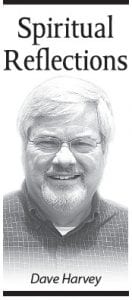A conversation I was having with one of our international student workers turned to religion. She was from a culture unfamiliar with any but the most stereotypic characterizations of Christianity. Like all of the young people I have met who have come from the other side of the globe to clean our resorts and help in our restaurants, she was extremely intelligent, affable, and curious. She knew English comparable to about a first-or second-grader and I knew none of her language. So communication was a struggle the minute our conversation ventured past the weather and how her day went.
Somehow we had come to the topic of the Trinity and the seeming irrationality of what St. Patrick described as our “belief in the threeness… and confession of the oneness of the Creator of Creation.” Dr. John Polkinghorne, a celebrated theoretical physicist and ordained Anglican priest, wrote of a similar problem that faced physicists studying the nature of light.
The question through the ages was: Is a beam of light a collection of little bullets of energy, or photons (like Star Trek’s photon torpedoes), or is it a stream of energy traveling in waves like sound or radio signals?
In the 1600s Newton held to the photon theory while a Dutch contemporary, Huyghens, insisted that it was a waveform. In the early 1800s Thomas Young performed experiments that demonstrated the wavelike characteristics of light. James Clerk Maxwell later confirmed Young’s work demonstrating that light was waves of electromagnetic energy. That settled the argument for good… until early in the 20th century when Max Plank and Albert Einstein demonstrated that, under certain circumstances, light behaved as if it were made up of bundled bullets or photons of energy.
In the late 1920s Paul Dirac proposed “quantum field theory.” Dr. Polkinghorne summarizes this theory by saying, “Light could give a wavelike answer if you asked a wave-like question, or a particle-like answer if you asked a particle-like question.” (p. 27, Quarks, Chaos and Christianity, 2005). Dr. Polkinghorne goes on to explain, “Quantum theory tells us that the way things behave on the scale of atoms or smaller is totally different from the way that ‘large’ objects behave in our everyday world.”
When examined with one set of questions, light presented itself as a collection of photons. When approached with a different set of questions, it appeared as waves of electromagnetic energy.
Physicists were forced to accept that, even though these dueling theories of the nature of light were mutually exclusive they were both undeniably true. This situation seemed totally irrational. Physicists were forced to conclude that either reality was fundamentally irrational and unknowable and therefore we must abandon the theory of quantum physics (which later became the backbone of modern physics), or that the irrational appearance of reality hid a deeper, yet unknown rationality… a unifying principle or model…that just needed discovering.
A similar question could be asked of spirituality in general and religious doctrines in particular. Are they unknowable and irrational or are there yet to be discovered unifying principles that allow seemingly impossible, conflicting concepts and experiences to be true? If you are happy with a Newtonian view of life, where everything is concrete and easily relatable to your everyday experience, you may be oversimplifying your view of the universe. Einstein’s physics do to a Newtonian world view what Trinitarian theology does to everyday sensibilities.
Einstein and modern, theoretical physics represents our most creative field of scientific enterprise. I can watch Morgan Freeman on the science program Through the Wormhole for about five minutes before my brain begins to turn to guacamole. Still, the creative possibilities present in the mind-boggling “impossibility” of it all is what makes it so wonderfully interesting.
With all this in mind, I believe that I should courageously practice at least as much faith as a modern physicist! Which is why I feel no shame in praying, “I arise today through a mighty strength, the invocation of the Trinity, through the belief in the threeness and confession of the oneness of the Creator of Creation.”
Each month a member of the Cook County Ministerium will offer Spiritual Reflections. For August, our contributor is Pastor Dave Harvey, who has served as pastor of Grand Marais Evangelical Free Church since February of 2008.



Loading Comments